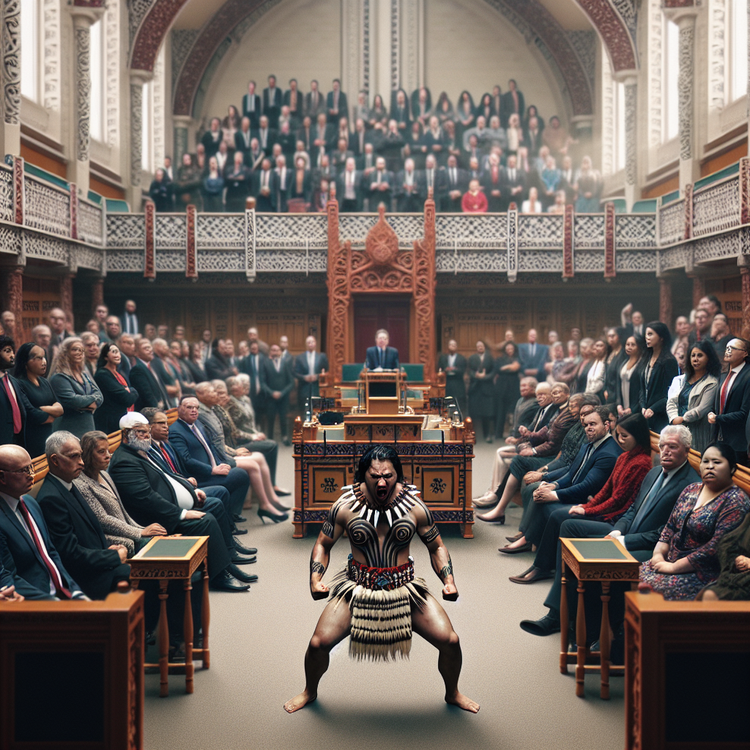Rawiri Waititi, a politician in New Zealand, recently made headlines for breaking protocol during his induction into parliament. Before swearing an oath to King Charles, Waititi performed a Maori haka, a traditional dance that is a symbol of strength and unity. Along with five other parliamentarians, Waititi chose to first pledge allegiance to their grandchildren, young people, and the country’s founding document, the Treaty of Waitangi. Waititi is the co-leader of Te Pati Maori, a political party that advocates for Maori rights. His induction coincided with controversy surrounding government plans to review affirmative action policies and reduce the use of the Maori language.
The haka is an important part of Maori culture and is often performed on significant occasions. It is a powerful display of strength, pride, and identity. Waititi’s decision to perform the haka before swearing his oath was seen as a bold statement of his commitment to Maori rights and his determination to bring attention to the issues facing the Maori community.
Waititi’s actions have sparked a debate about the role of Maori culture and language in New Zealand’s government and society. Some argue that it is important to preserve and promote Maori culture as an integral part of the country’s identity, while others believe that it is unnecessary and divisive. The controversy surrounding affirmative action policies and the use of the Maori language reflects the ongoing struggle for recognition and equality for Maori people in New Zealand.
Waititi’s haka performance has garnered both praise and criticism. Supporters see it as a powerful and symbolic act of defiance and a reminder of the importance of Maori culture in New Zealand. Critics argue that it was inappropriate and disrespectful to break protocol during the induction ceremony. However, Waititi’s actions have brought attention to the issues facing the Maori community and have sparked a broader discussion about the place of indigenous cultures in modern society.
Overall, Waititi’s haka performance before swearing his oath to King Charles has ignited a debate about Maori rights and the role of Maori culture in New Zealand. It has highlighted the ongoing struggle for recognition and equality for the Maori community and has sparked a broader discussion about the place of indigenous cultures in society.
Original news source: Watch: Maori MP performs haka before swearing oath to King (BBC)
Listen:
Slow
Normal
Fast
Vocabulary:
| 1 | protocol | A set of rules or guidelines that must be followed in a particular situation |
| 2 | induction | The process of formally introducing someone into a new job or position |
| 3 | haka | A traditional Maori dance that symbolizes strength and unity |
| 4 | allegiance | Loyalty or commitment to a person, group, or cause |
| 5 | affirmative action | Policies or actions that are intended to give special advantages to groups that have been historically disadvantaged |
| 6 | divisive | Causing disagreement or hostility between people or groups |
| 7 | controversy | A public disagreement or debate about a controversial issue |
| 8 | defiance | Open resistance or disobedience to authority or rules |
| 9 | recognition | The act of acknowledging or accepting someone or something as valid or important |
| 10 | equality | The state of being equal, especially in status, rights, and opportunities |
| 11 | indigenous | Originating or occurring naturally in a particular place; native |
| 12 | significant | Having great importance or meaning |
| 13 | preserve | To protect or keep something in its original or existing state |
| 14 | promote | To support or encourage the growth or development of something |
| 15 | integral | Necessary or essential for completeness or wholeness |
Group or Classroom Activities
Warm-up Activities:
– Charades
Instructions: Divide the class into two teams. Assign each team a word or phrase related to the article (e.g. “haka,” “Maori culture,” “affirmative action”). One member from each team will come to the front and act out the word or phrase without speaking. The team members will try to guess the word or phrase within a time limit. The team that guesses correctly gets a point. Repeat with different words or phrases from the article.
– News Summary
Instructions: In pairs or small groups, students will take turns summarizing the main points of the article to their partner(s). They should try to include key details and important information while keeping their summary concise. After each summary, the listeners can ask questions or provide feedback. Rotate partners and repeat the activity with different sections of the article.
– Opinion Poll
Instructions: Create a list of statements related to the article (e.g. “Maori culture should be protected and promoted,” “Affirmative action policies are necessary for achieving equality”). Have students walk around the classroom and ask their classmates for their opinions on each statement. They should record the responses (agree/disagree) and ask follow-up questions to understand different perspectives. Afterward, students can share their findings and engage in a class discussion about the opinions expressed.
– Vocabulary Pictionary
Instructions: Write a selection of vocabulary words from the article on small slips of paper. Divide the class into teams. One member from each team will pick a word and draw it on the board without using any letters or numbers. The rest of their team will try to guess the word. The team that guesses correctly gets a point. Repeat with different vocabulary words from the article.
– Think-Pair-Share
Instructions: Ask the students to take a few minutes to think about the following question: “What impact do you think Waititi’s haka performance will have on the Maori rights movement in New Zealand?” Afterward, have them pair up with a classmate and discuss their thoughts. Encourage them to share their opinions, provide reasons, and ask questions of each other. Finally, have a class discussion where students can share their ideas and engage in a respectful debate on the topic.
Comprehension Questions:
1. What is the significance of the Maori haka in Maori culture?
2. Why did Rawiri Waititi choose to perform the haka before swearing his oath in parliament?
3. How has Waititi’s haka performance been received by the public?
4. What are some arguments for preserving and promoting Maori culture in New Zealand?
5. What are some arguments against preserving and promoting Maori culture in New Zealand?
6. How has Waititi’s haka performance sparked a broader discussion about indigenous cultures?
7. What issues are facing the Maori community in New Zealand?
8. How has Waititi’s haka performance brought attention to the struggles of the Maori community?
Go to answers ⇩
Listen and Fill in the Gaps:
Rawiri Waititi, a politician in New Zealand, recently made headlines for breaking protocol during his induction into parliament. Before swearing an oath to King Charles, Waititi (1)______ a Maori haka, a traditional dance that is a symbol of strength and unity. Along with five other parliamentarians, Waititi chose to (2)______ pledge allegiance to their grandchildren, young people, and the country’s founding document, the (3)______ of (4)______. Waititi is the co-leader of Te Pati Maori, a political party that advocates for Maori rights. His induction coincided with controversy surrounding government plans to review affirmative action (5)______ and reduce the use of the Maori language.
The haka is an important part of Maori culture and is often performed on significant occasions. It is a powerful display of strength, pride, and identity. Waititi’s decision to perform the haka before swearing his oath was seen as a bold statement of his commitment to Maori rights and his determination to (6)______ attention to the issues facing the Maori (7)______.
Waititi’s actions have sparked a debate about the role of Maori culture and language in New Zealand’s government and (8)______. Some argue that it is important to (9)______ and (10)______ Maori culture as an integral part of the country’s identity, while others believe that it is unnecessary and divisive. The controversy surrounding affirmative action policies and the use of the Maori language reflects the ongoing struggle for recognition and equality for Maori people in New Zealand.
Waititi’s haka performance has garnered both praise and criticism. Supporters see it as a (11)______ and (12)______ act of defiance and a reminder of the importance of Maori culture in New Zealand. Critics argue that it was inappropriate and disrespectful to (13)______ protocol during the induction ceremony. However, Waititi’s actions have brought attention to the issues (14)______ the Maori community and have (15)______ a broader discussion about the place of indigenous cultures in modern society.
Overall, Waititi’s haka performance before swearing his oath to King Charles has ignited a debate about Maori rights and the role of Maori culture in New Zealand. It has highlighted the ongoing struggle for (16)______ and equality for the Maori community and has sparked a broader discussion about the place of indigenous cultures in society.
Go to answers ⇩
Discussion Questions:
Students can ask a partner these questions, or discuss them as a group.
1. What is a Maori haka and why is it important in Maori culture?
2. How would you feel if a politician in your country broke protocol during their induction ceremony? Why?
3. Do you think it is important for politicians to prioritize the needs and rights of indigenous communities? Why or why not?
4. What is your opinion on affirmative action policies? Do you think they are necessary for achieving equality? Why or why not?
5. How do you think the use of the Maori language in government and society can promote inclusivity and diversity?
6. Do you believe that indigenous cultures should be preserved and promoted as an integral part of a country’s identity? Why or why not?
7. How do you think Waititi’s haka performance has impacted the Maori community in New Zealand?
8. What are some ways that governments can work towards achieving recognition and equality for indigenous communities?
9. How do you think the controversy surrounding the use of the Maori language reflects broader issues of language preservation and cultural identity?
10. Do you think it is important for politicians to use their platform to bring attention to the issues facing marginalized communities? Why or why not?
11. How do you think Waititi’s actions have influenced the public’s perception of Maori culture and rights in New Zealand?
12. What are some potential benefits and drawbacks of breaking protocol during a public ceremony to make a statement?
13. How can society strike a balance between preserving indigenous cultures and embracing modernity?
14. Do you think it is necessary for governments to review and update affirmative action policies? Why or why not?
15. How can individuals and communities support and advocate for the rights of indigenous peoples in their own countries?
Individual Activities
Vocabulary Meanings:
Match each word to its meaning.
Words:
1. protocol
2. induction
3. haka
4. allegiance
5. affirmative action
6. divisive
7. controversy
8. defiance
9. recognition
10. equality
11. indigenous
12. significant
13. preserve
14. promote
15. integral
Meanings:
(A) Causing disagreement or hostility between people or groups
(B) Having great importance or meaning
(C) Policies or actions that are intended to give special advantages to groups that have been historically disadvantaged
(D) A set of rules or guidelines that must be followed in a particular situation
(E) Necessary or essential for completeness or wholeness
(F) The process of formally introducing someone into a new job or position
(G) Loyalty or commitment to a person, group, or cause
(H) The act of acknowledging or accepting someone or something as valid or important
(I) To support or encourage the growth or development of something
(J) Open resistance or disobedience to authority or rules
(K) The state of being equal, especially in status, rights, and opportunities
(L) A public disagreement or debate about a controversial issue
(M) Originating or occurring naturally in a particular place; native
(N) A traditional Maori dance that symbolizes strength and unity
(O) To protect or keep something in its original or existing state
Go to answers ⇩
Multiple Choice Questions:
1. What is the name of the politician who performed a Maori haka during his induction into parliament?
(a) Rawiri Waititi
(b) King Charles
(c) Te Pati Maori
(d) Treaty of Waitangi
2. What is the haka?
(a) A type of food
(b) A political party
(c) A language
(d) A traditional Maori dance
3. What did Waititi and five other parliamentarians choose to pledge allegiance to before swearing their oath?
(a) King Charles and the Maori language
(b) The government’s plans to review affirmative action policies
(c) Their grandchildren, young people, and the Treaty of Waitangi
(d) The controversy surrounding Maori culture
4. What is the Treaty of Waitangi?
(a) A Maori dance
(b) A political party
(c) New Zealand’s founding document
(d) An affirmative action policy
5. What has sparked a debate about the role of Maori culture and language in New Zealand?
(a) The controversy surrounding affirmative action policies
(b) Waititi’s actions
(c) The use of the Maori language
(d) The struggle for recognition and equality for Maori people
6. How have supporters of Waititi’s haka performance described it?
(a) Inappropriate and disrespectful
(b) A powerful and symbolic act of defiance
(c) Divisive and unnecessary
(d) A reminder of the importance of King Charles
7. What do critics argue about Waititi’s haka performance?
(a) It was inappropriate and disrespectful
(b) It was a powerful and symbolic act of defiance
(c) It brought attention to the issues facing the Maori community
(d) It highlighted the ongoing struggle for recognition and equality for Maori people
8. What has Waititi’s haka performance sparked?
(a) A debate about Maori rights
(b) A controversy surrounding affirmative action policies
(c) A discussion about the importance of King Charles
(d) A broader discussion about the place of indigenous cultures in society
True or False Questions:
1. Waititi’s exclusion from parliament coincided with controversy surrounding affirmative action policies and the use of the Maori language.
2. Rawiri Waititi is a politician in New Zealand.
3. Waititi’s haka performance has stifled a debate about the role of Maori culture and language in New Zealand’s government and society.
4. Waititi chose to pledge allegiance to his grandchildren, young people, and the Treaty of Waitangi before swearing an oath to King Charles.
5. Waititi’s actions have disregarded attention to the issues facing the Maori community and have stymied a broader discussion about the place of indigenous cultures in modern society.
6. Waititi is the co-leader of Te Pati Maori, a political party advocating for Maori rights.
7. The haka is a modern dance that symbolizes weakness and division.
8. Waititi performed a Maori haka during his induction into parliament.
Go to answers ⇩
Write a Summary:
Write a summary of this news article in two sentences.
Writing Questions:
Answer the following questions. Write as much as you can for each answer.
1. What is the significance of the Maori haka in Maori culture?
2. How did Rawiri Waititi’s haka performance before swearing his oath make a statement about Maori rights?
3. What is the controversy surrounding affirmative action policies and the use of the Maori language in New Zealand?
4. How have supporters and critics reacted to Waititi’s haka performance?
5. What broader discussion has Waititi’s haka performance sparked about the place of indigenous cultures in society?
Answers
Comprehension Question Answers:
1. What is the significance of the Maori haka in Maori culture?
The Maori haka is a traditional dance that symbolizes strength and unity in Maori culture. It is often performed on significant occasions and is a powerful display of pride and identity.
2. Why did Rawiri Waititi choose to perform the haka before swearing his oath in parliament?
Waititi chose to perform the haka as a bold statement of his commitment to Maori rights and to bring attention to the issues facing the Maori community.
3. How has Waititi’s haka performance been received by the public?
Waititi’s haka performance has garnered both praise and criticism. Supporters see it as a powerful and symbolic act of defiance, while critics argue that it was inappropriate and disrespectful to break protocol during the induction ceremony.
4. What are some arguments for preserving and promoting Maori culture in New Zealand?
Some arguments for preserving and promoting Maori culture in New Zealand include the importance of cultural heritage, the need for recognition and equality for the Maori community, and the role of Maori culture in shaping the country’s identity.
5. What are some arguments against preserving and promoting Maori culture in New Zealand?
Some arguments against preserving and promoting Maori culture in New Zealand include the belief that it is unnecessary and divisive, concerns about the use of public resources for cultural preservation, and a lack of understanding or appreciation for Maori culture.
6. How has Waititi’s haka performance sparked a broader discussion about indigenous cultures?
Waititi’s haka performance has sparked a broader discussion about the place of indigenous cultures in modern society. It has raised questions about the recognition and equality of indigenous peoples, the preservation of cultural heritage, and the role of indigenous cultures in shaping national identity.
7. What issues are facing the Maori community in New Zealand?
The Maori community in New Zealand faces issues such as inequality, limited access to education and healthcare, high rates of incarceration, and the preservation of their language and cultural traditions.
8. How has Waititi’s haka performance brought attention to the struggles of the Maori community?
Waititi’s haka performance has brought attention to the struggles of the Maori community by highlighting the ongoing issues of inequality, the need for recognition and equality, and the preservation of Maori culture and language. It has sparked a broader discussion about these issues and the place of indigenous cultures in New Zealand.
Go back to questions ⇧
Listen and Fill in the Gaps Answers:
(1) performed
(2) first
(3) Treaty
(4) Waitangi
(5) policies
(6) bring
(7) community
(8) society
(9) preserve
(10) promote
(11) powerful
(12) symbolic
(13) break
(14) facing
(15) sparked
(16) recognition
Go back to questions ⇧
Vocabulary Meanings Answers:
1. protocol
Answer: (D) A set of rules or guidelines that must be followed in a particular situation
2. induction
Answer: (F) The process of formally introducing someone into a new job or position
3. haka
Answer: (N) A traditional Maori dance that symbolizes strength and unity
4. allegiance
Answer: (G) Loyalty or commitment to a person, group, or cause
5. affirmative action
Answer: (C) Policies or actions that are intended to give special advantages to groups that have been historically disadvantaged
6. divisive
Answer: (A) Causing disagreement or hostility between people or groups
7. controversy
Answer: (L) A public disagreement or debate about a controversial issue
8. defiance
Answer: (J) Open resistance or disobedience to authority or rules
9. recognition
Answer: (H) The act of acknowledging or accepting someone or something as valid or important
10. equality
Answer: (K) The state of being equal, especially in status, rights, and opportunities
11. indigenous
Answer: (M) Originating or occurring naturally in a particular place; native
12. significant
Answer: (B) Having great importance or meaning
13. preserve
Answer: (O) To protect or keep something in its original or existing state
14. promote
Answer: (I) To support or encourage the growth or development of something
15. integral
Answer: (E) Necessary or essential for completeness or wholeness
Go back to questions ⇧
Multiple Choice Answers:
1. What is the name of the politician who performed a Maori haka during his induction into parliament?
Answer: (a) Rawiri Waititi
2. What is the haka?
Answer: (d) A traditional Maori dance
3. What did Waititi and five other parliamentarians choose to pledge allegiance to before swearing their oath?
Answer: (c) Their grandchildren, young people, and the Treaty of Waitangi
4. What is the Treaty of Waitangi?
Answer: (c) New Zealand’s founding document
5. What has sparked a debate about the role of Maori culture and language in New Zealand?
Answer: (b) Waititi’s actions
6. How have supporters of Waititi’s haka performance described it?
Answer: (b) A powerful and symbolic act of defiance
7. What do critics argue about Waititi’s haka performance?
Answer: (a) It was inappropriate and disrespectful
8. What has Waititi’s haka performance sparked?
Answer: (d) A broader discussion about the place of indigenous cultures in society
Go back to questions ⇧
True or False Answers:
1. Waititi’s exclusion from parliament coincided with controversy surrounding affirmative action policies and the use of the Maori language. (Answer: False)
2. Rawiri Waititi is a politician in New Zealand. (Answer: True)
3. Waititi’s haka performance has stifled a debate about the role of Maori culture and language in New Zealand’s government and society. (Answer: False)
4. Waititi chose to pledge allegiance to his grandchildren, young people, and the Treaty of Waitangi before swearing an oath to King Charles. (Answer: True)
5. Waititi’s actions have disregarded attention to the issues facing the Maori community and have stymied a broader discussion about the place of indigenous cultures in modern society. (Answer: False)
6. Waititi is the co-leader of Te Pati Maori, a political party advocating for Maori rights. (Answer: True)
7. The haka is a modern dance that symbolizes weakness and division. (Answer: False)
8. Waititi performed a Maori haka during his induction into parliament. (Answer: True)
Go back to questions ⇧















